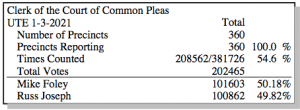
My bad cat, Rocky, shown studying the new MCDP Constitution
Last year, I served on the MCDP Constitution Committee, chaired by Mark Owens. In its one and only meeting, the Committee voted on the nine possible changes to the MCDP Constitution that I had proposed. The Committee approved the first four — establishing that the mission of the organization is to “empower democracy” — but rejected the five proposals to establish new endorsement procedures.
I was happy that Mark agreed to the four changes to the MCDP Constitution. I was surprised. I had assumed that a proposal to change the stated purpose of the MCDP organization would be a big deal and would stimulate discussion. I was wrong. I also was surprised that at the June Reorganization Meeting, there was no discussion or debate concerning ratifying the four proposed changes to the MCDP Constitution, as recommended by the Constitution Committee.
The new preamble / statement of purpose make the MCDP Constitution absolutely unique compared to the constitutions of the other 87 Democratic county organizations in Ohio. The new MCDP Constitution is one that Montgomery County Democrats can be proud of. (I’m disappointed that it is not posted on the MCDP website.) It establishes the foundation for the transformation of the MCDP organization. It provides the way to build an exemplary and powerful 21st Century Democratic Party in this county.
These four changes to the MCDP Constitution were approved at the June, 2018, MCDP Reorganization Meeting:
- A new PREAMBLE: “WE THE REPRESENTATIVES of the Democrats living in Montgomery County — in order to form a strong party organization that empowers representative democracy within our party and throughout the county — do establish this Montgomery County Democratic Party Constitution.”
- A new NAME: “The Montgomery County Democratic Party.”
- A new PURPOSE: In accordance with the provisions of Section 3517 of the Ohio Revised Code, this organization shall be the “Controlling Committee” of the Democratic Party of Montgomery County. The purpose of the Montgomery County Democratic Party is to represent and to serve Montgomery County Democrats. The MCDP advances this purpose: by connecting Montgomery County Democrats within an extended MCDP community where every member has a voice, by advancing candidates of the people who are dedicated to public service and whose principles align with those of the Democratic Party.
- A new emphasis on MEMBERSHIP: “The MCDP welcomes all Democrats registered in Montgomery County to become a member of the MCDP organization.
The Expired MCDP Constitution
ARTICLE I. NAME
The name of this organization shall be the MONTGOMERY COUNTY DEMOCRATIC CENTRAL COMMITTEE.
ARTICLE II. PURPOSE
In accordance with the provisions of Section 3517 of the Ohio Revised Code, this organization shall be the “Controlling Committee” of the Democratic Party of Montgomery County.
The expired constitution, still posted on the MCDP website, advanced the notion that power is gained through party discipline and through central control. The old constitution provided the foundation for the MCDP to be organized as a pyramidal, authoritarian, political boss system. The members of this “controlling committee” felt empowered — by a long-standing political boss tradition — to deliberately repress participation in Democratic primaries. See these posts from over ten years ago:
The new constitution advances the idea that power is gained through making representative democracy effective — in the party and in the society at large. The new constitution provides the foundation for the MCDP to be a “strong organization that empowers representative democracy within our party and throughout the county.”
I write here, Democrats Should Fight A Contest We Can Win — Not One We Are Doomed To Lose: “As Democrats we must shift our understanding of the contest we are in. We are distracted when we focus on the Democratic Party winning. We need to look deeper and see that the central contest we must win is the contest to make our system of representative democracy work as it should. The Republicans realize that if the system worked as it should, the public policies they advocate would not have a chance of becoming law. It’s to the advantage of Republicans to aggravate polarization, to advance misinformation and to repress voting. It’s to the advantage of Democrats to do the opposite. Democrats need to focus on the contest that is winnable. We can win the contest to be the party of the people; we can win the contest to be the party that empowers democracy.”
Good news. I write here — The Transformation Needed In The Democratic Party Is Starting Here In Montgomery County — “The big news is that largely because of the efforts of Tim and Alison Benford, the membership of the Central Committee increased by more than 70% — roughly from 130 members to 225 members (I don’t have the latest number). The Central Committee for 2018-2022 is much larger and its members are more engaged than any time in the last twenty or thirty years — potentially, these new members will provide a great influx of new energy and new ideas.”
David Esrati acknowledged my birthday, Dec 31, and wrote: “HBD Mike. This year — do what you say, say what you do. And don’t pontificate so much — act.”
Ouch. David is pointing to my failure at the December Central Committee meeting to follow through with my stated plan to make three motions. The opportunity for making those motions came at the end of the regular meeting and after a number of voices in the room loudly called for adjournment — in order to start the Christmas party — I decided my motions should wait. But David is right, I should have done what I had declared I would do. My reply:
“David — Wise words. Thanks. …
As a member of the Constitution Committee, you will remember the days and hours we argued and debated; you will remember the hundreds of MCDP Democrats that we interviewed. Our accomplishment was that we reached a consensus and actually changed the MCDP Constitution. The purpose of the MCDP, now, according to this hard-fought constitution, is to “empower representative democracy within our party and throughout the county.” I’m hoping that you will use your large microphone and help spread this message and I’m hoping we can work together to find consensus for a plan going forward to accomplish this purpose.
We need to outline a process in OHD-39 that will move MCDP away from the “empowering friends and family” brand, as you refer to it, and instead start establishing that we are the “empowering representative democracy” brand. Fred Strahorn cannot seek reelection to represent OHD-39 in 2020 — term limited. So, the challenging task is to define a process that will work to generate the best candidate. How can the MCDP encourage a new generation of leaders in this strong Democratic district to emerge? It would be useful to write a proposal for a plan of action for discussion in the Central Committee.
If the goal was to find the best banjo player or the best rapper among the OHD-39 residents, “America’s Got Talent” has a process for motivating banjo players and rappers to make the effort for competition. AGT has a process for reaching consensus as to who the best rapper or banjo player might be. The MCDP needs to establish a process that will motivate candidates of the people who are dedicated to public service to seek election. My suggestion is that we form a committee to establish a plan — and that we present this plan to the Central Committee for further discussion and approval. The idea is that this committee will be open to all Dems who are interested, not just Central Committee members.
We need a plan for getting citizens to vote in those precincts that are strongly Democratic. There are precincts, as you know, that vote 95% Democratic, but where only a small fraction of the registered voters actually cast a ballot. GOTV effort is focused in these precincts the last few weeks of a campaign, but even a big GOTV effort — like that made this 2018 election — is ineffective (40% turn-out). The Central Committee should investigate and develop a long-range plan that advances the MCDP mission and works to make dramatic improvement in these strong Democratic precincts. My thought is that a good way to inspire discussion is to present a specific proposal and to make the proposal the focus of discussion. A good challenge would be to write a plan for OHD-39 — our heavily gerrymandered district — outlining a comprehensive plan of action, and to present this plan for discussion and for improvement and for a united consensus about a plan to go forward.
Could we use a competitive process to generate a plan for OHD-39? I’m thinking it would be fun to write a first draft of a Request For Proposal for the development of a detailed OHD-39 plan. Such a RFP would define the OHD-39 problem and would explain the criteria for evaluating project success. It would seek solutions based on building the MCDP as “a strong organization that empowers representative democracy within our party and throughout the county.”
My thinking has changed. Thank you Donald Trump. I’m gripped by the conviction that we are in desperate need of a strong Democratic Party. We need a sense of urgency that maintaining the status quo is not good enough — doing more of the same, but with greater enthusiasm, is not good enough.We need a vision of a twenty-first century Democratic Party.
Finally, from a June, 2018 post — To Become A Strong Organization, The MCDP Central Committee Must Commit To Acting As A Representative Body: “We need to have a debate about what a strong twenty-first century Democratic Party would look like. I’ve come to the conclusion that only democracy can save the Democratic Party, and that only a Democratic Party committed to democracy can be saved. A commitment to democracy must begin in the party. We must walk the walk. The Central Committee must come to grips with its responsibility to act as a representative body.”



 mmittee
mmittee 





















